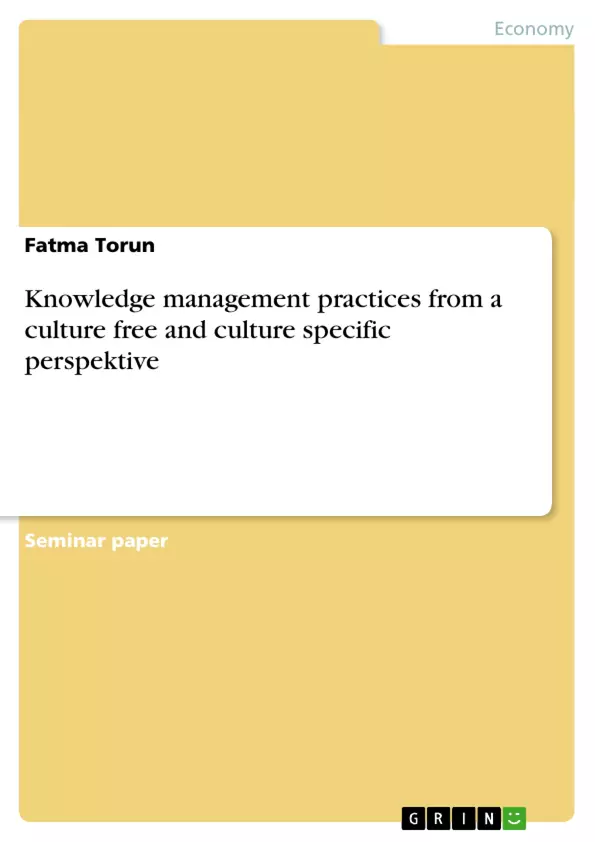The Cultural Wall
“Recently a large global company set up a sophisticated website for employees in international subsidiaries to share knowledge. It had areas for chat, document storage, and messages from the company’s leadership. Everything was clearly segmented so information could be looked up in many different ways. The designers expected people to load many documents onto the site. But even it was interesting, easy to use, and had many features, hardly anyone visited the website. Potential users said that they liked it, but just did not have time for it. The designers felt that they hit the ‘cultural wall’.”
1.1 The Influence of National Culture on Knowledge Management
Today, most organisations are aware that managing their knowledge effectively is the only way to achieve sustainable competitive advantage (Drucker, 2001). Companies not securing systematically knowledge for later usage, risk to reinvent solutions and to incur unnecessary expense to relearn the same lessons (Tiwana, 1999). But in an increasingly global business context, companies not only need to understand the importance of knowledge management but also the importance of (national) cultural differences which influence knowledge management processes. Recognising cultural differences is an important step to anticipating potential threats as well as opportunities. [...]
Inhaltsverzeichnis (Table of Contents)
- Introduction
- The Influence of National Culture on Knowledge Management
- Objectives
- Scope and Limitations
- Literature Review
- Cultural Issues
- Definition of Culture
- Culture Free versus Culture Specific
- Knowledge Management Issues
- Definition of Knowledge
- Knowledge Management
- Knowledge Management Systems
- Knowledge Management - Culture Free or Culture Specific?
- The Cultural Free View
- The Culture Specific View
- National Culture: Hofstede's Model of Spain and Germany
- National Culture and Knowledge Management
- Application: Knowledge Management at XXX
- Knowledge Management at XXX Germany
- Knowledge Management for the Project XY
- Knowledge Management Initiatives at XXX Spain
- Why did Knowledge Management fail at XXX Spain?
- Culture Specific Reasons
- Culture Free Reasons
- Implications
- Conclusion and Recommendations for Further Research
Zielsetzung und Themenschwerpunkte (Objectives and Key Themes)
This report aims to explore the influence of national culture on knowledge management processes and how national culture can either facilitate or hinder a company's ability to implement organization-wide knowledge management efforts.
- The impact of national culture on knowledge management practices.
- The distinction between culture-free and culture-specific approaches to knowledge management.
- The application of Hofstede's cultural dimensions model to understand the influence of culture on knowledge management.
- An analysis of a failed knowledge management project at XXX to identify cultural factors contributing to its failure.
- Recommendations for improving knowledge management initiatives by considering cultural differences.
Zusammenfassung der Kapitel (Chapter Summaries)
- Introduction: This chapter introduces the concept of the "cultural wall" as a barrier to knowledge sharing in global organizations. It emphasizes the importance of understanding national cultural differences to successfully implement knowledge management practices.
- Literature Review: This chapter explores the theoretical framework for understanding cultural influences on knowledge management. It defines culture and distinguishes between culture-free and culture-specific perspectives on knowledge management. It also introduces Hofstede's model of national culture, focusing on its application to Spain and Germany.
- Application: Knowledge Management at XXX: This chapter examines the implementation of knowledge management practices at XXX, both in Germany and Spain. It highlights a failed knowledge management project at XXX Spain and analyzes the cultural factors contributing to its failure.
Schlüsselwörter (Keywords)
This report focuses on knowledge management practices from both a culture-free and a culture-specific perspective, with particular emphasis on the influence of national culture on these practices. The report uses Hofstede's cultural dimensions model to analyze the impact of cultural differences on knowledge sharing and collaboration in multinational organizations. Key terms and concepts include knowledge management, cultural differences, Hofstede's model, culture-free and culture-specific perspectives, and successful implementation of knowledge management initiatives.
Frequently Asked Questions
What is the "Cultural Wall" in knowledge management?
The "Cultural Wall" refers to invisible barriers created by national cultural differences that prevent employees from using knowledge-sharing tools, even if they are technically well-designed.
What is the difference between culture-free and culture-specific knowledge management?
Culture-free views assume KM tools work globally regardless of location, while culture-specific views argue that KM processes must be adapted to local cultural norms and values.
How does Hofstede's model apply to knowledge management?
Hofstede’s dimensions (like individualism or power distance) help explain why certain cultures are more or less inclined to share knowledge openly or follow top-down KM initiatives.
Why did the knowledge management project fail at XXX Spain?
The failure was attributed to both culture-free reasons (lack of time) and culture-specific factors that hindered the adoption of a system designed in a different cultural context (Germany).
Why is managing knowledge effectively vital for global companies?
It is the only way to achieve sustainable competitive advantage and avoid "reinventing the wheel" or incurring unnecessary expenses to relearn lessons already known elsewhere in the firm.
- Citar trabajo
- Fatma Torun (Autor), 2004, Knowledge management practices from a culture free and culture specific perspektive, Múnich, GRIN Verlag, https://www.grin.com/document/32960



